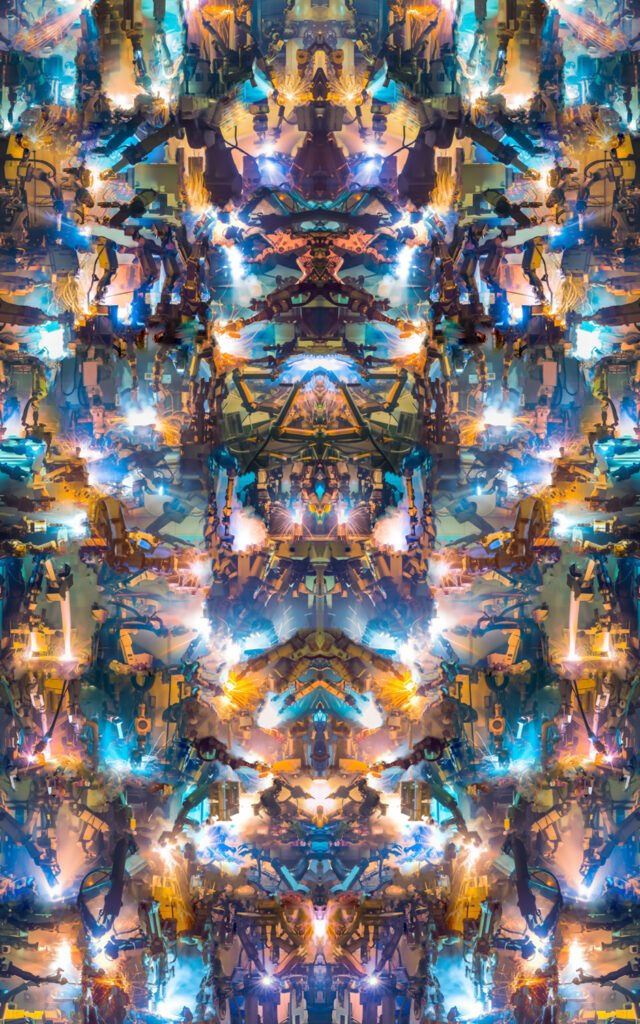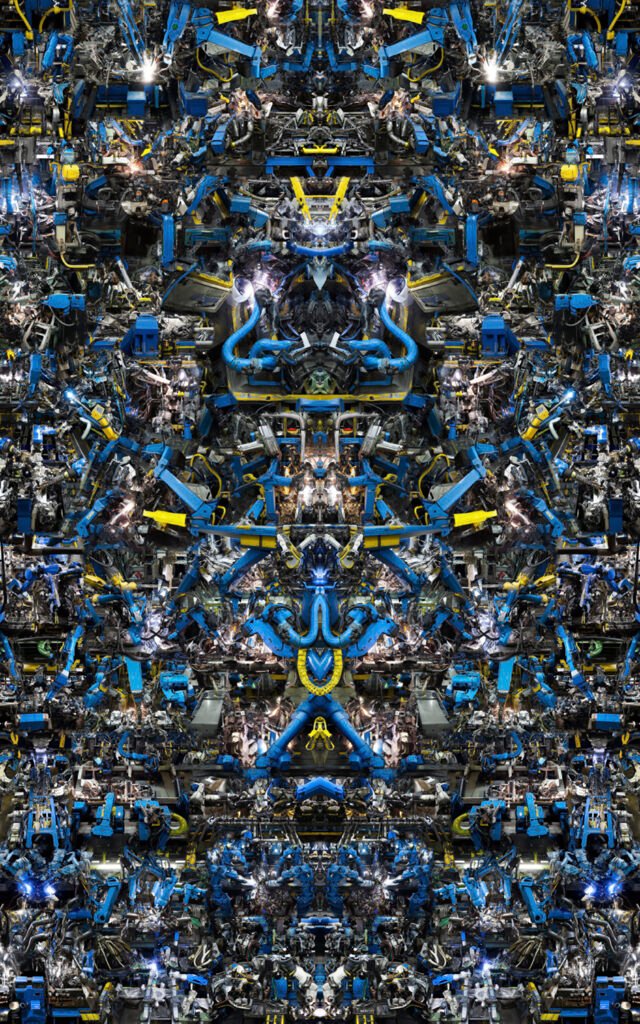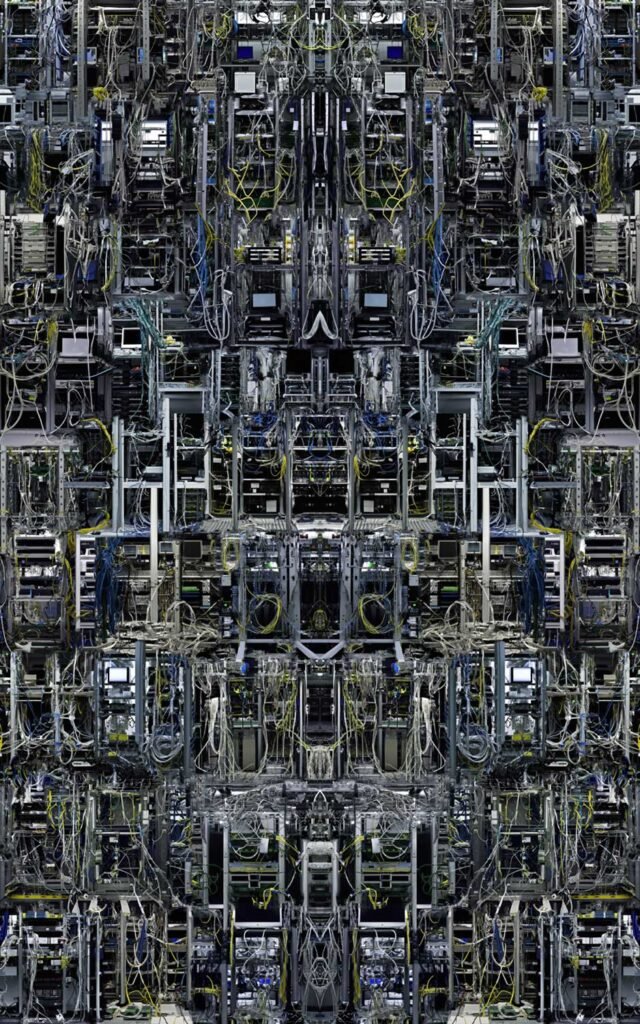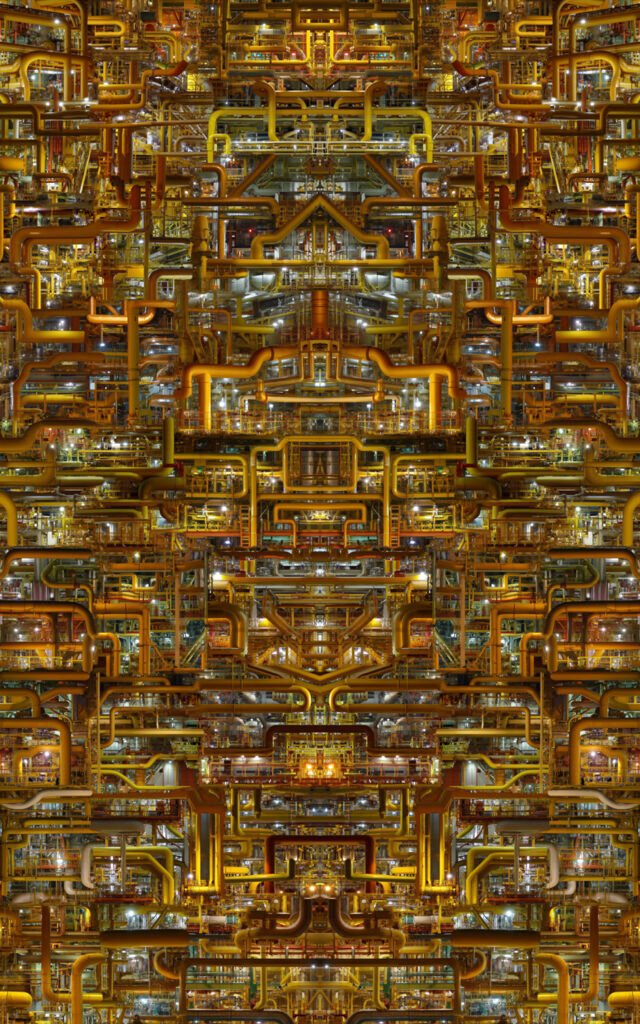The era of Artificial intelligence is usually imagined as the time when humanoid robots will interact with us in our daily lives. Failing to realize that we have been interacting with AI for some time now already led me to wonder how to visualize software rather than through the hardware it manifests itself? If AI is the spirit what can be its body?
Work has always been a part of human life to be regulated by religion, ideology, and governors. One’s job defined the person’s place in society, perceived identity, and self-esteem. In this series of works I decided to focus on industrial settings as I find it important to reflect especially on this creative and productive aspect of AI that now is able to operate a production line with the minimum help of human workers.
Throughout human history, creativity was considered to be a divine power. Gods were believed to be the ones that created the world and humankind. In ancient Greece, inspiration was granted to mortals by the Muses, and thus artists were considered vessels through which higher truths could be translated into an art form accessible to humans. Today AI doesn’t need any other inspiration than its training set of billions of images created by the painstaking effort of humans.
To create those structures that I call Technototems I insert a text prompt to a text-to-image generating AI using a prompt like, for example, ” a complex and sophisticated structure of pipes, valves, manometers, used in oil refineries”, then I select an image I like and ask the program to create many variations of it. I use the images produced by the AI as tiles. To create the final result I mirror half of the constructed image. The rest of the process seems to happen inside our brain, where just as machine vision’s first field to be evolved was face recognition, the fusiform gyrus area of our brain that is dedicated to face recognition tricks us to see faces in everyday objects, an illusion that is called face pareidolia, and thus animate these structures into beings.
Since AI spreads across productive and creative industries and work positions are eliminated, are we condemned or freed? Are we giving up too much of ourselves in exchange for the hard work it offers to do for us? What happens inside AI’s opaque, complex, mathematical minds? What do they want? What are their ethics? Who are these entities? Are they restless slaves we exploit or the masters we obey?
Maria Mavropoulou was born in 1989, she lives and works in Athens, Greece. She is a visual artist using mainly photography while her work expands to new forms of photographic images, such as VR and screen-captured images, GAN and AI-generated images. Her work and research focus on the new realities created by the connectible devices and the contradictions between the physical and the virtual spaces that we inhabit, addressing issues of technological mediation. By using the most novel technology available to her, she creates work that reflects on the new ways images are produced today. Her work explores digital identity and representation in the post-social media era, algorithmic bias, network culture, power politics between machines and humans, and the multidimensionality of our experiences in our always-online world.
Maria holds a Master’s in Fine Arts and a BA from the Athens School of Fine Arts. Her work is part of private collections and Vontobel art collection and has been exhibited in institutions and museums in Greece and abroad among which are the National Museum of Contemporary Art of Greece- EMST (2022), Sharjah Foundation (United Arab Emirates 2022), Foto Colectania, (Spain 2022), Tallinn Art Hall, (Estonia 2021), Miami Art week, (2020), 60th Thessaloniki International Film Festival(2019), Thessaloniki Museum of Photography(2019), Onassis cultural center (2019), Athens Conservatoire(2019), Slought Foundation (Philadelphia, USA 2019), Maison de la Photographie, (France 2018), Benaki museum(2018), Unseen Amsterdam, (Netherlands 2018) National Observatory of Athens (2018), Culturescapes festival (Basel, Switzerland, 2017) Athens Photo Festival (2016), Athens Biennale (2015) Mois de la photo,(Paris, France, 2014). Her first VR project Family Portraits has been awarded at the 60th Thessaloniki International Film Festival (2019), and she has also been selected among 30 Under 30 Women Photographers (2018) and a Young Greek Photographer by Athens Photo Festival (2016)
Maria Mavropoulou also works as a freelance photographer specializing in architecture and interior photography and she is a contributing photographer for the New York Times. For more information on her commissioned work visit www.roundcubephoto.com









